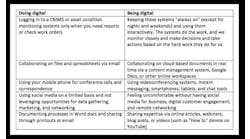Cast Study: Pivoting to mass produce PPE for frontline medical professionals
By Jim Goode, president of American Innotek, the parent company of Tru-Form Plastics
To help address the global shortage of personal protective equipment (PPE) amid the continued spread of COVID-19, many companies across the country have taken tremendous initiatives to pivot their businesses to develop and produce masks and shields by the thousands. These producers range from businesses who already manufactured medical equipment (like ours) to companies whose typical function is way outside of the medical-device space (like Nike).
Regardless of the magnitude of new PPE-producing processes, making this change requires organizational agility in order to support the production of a new product, maintain demands for typical business functions, and ensure the employees needed for this production are taken care of in a global pandemic.
At Tru-form Plastics, we added staff to support a six-day work week and produce more than 100,000 face shields per day, and have now added Sani-Shield Barriers, using medical-grade plastic and custom designs to apply to different business needs (i.e. branded shields for restaurants).
Here are some of the lessons we’ve learned from that shift.
Listen to industry professionals
When our engineering & tooling manager, Ed Hentges, was approached to develop a PPE-shortage solution, he immediately met with the director of the supply chain at a local hospital to brainstorm the face shield. Once an original prototype was designed, he went to the hospital to work directly with doctors and nurses and made adjustments until a workable solution was in place. Rather than making assumptions or waiting for delays by mailing the mask, he was able to quickly design the best solution with hands-on feedback, which allowed us to go from concept to the production line in just a few days.
As businesses reopen and expand operations, we have made adjustments to these shields and even begun developing products to align with needs across the industry spectrum. After originally developing the face shield for medical providers in March, we’ve since developed more flexible face shields for dentists and other professions, as well as Sani-Shield Barriers for restaurants and other businesses requiring PPE barriers.
Making nimble staffing decisions
To support mass production of a new product—on top of existing manufacturing needs—it’s important to ensure flexibility in staffing decisions. For us, this included the addition of more than 60 temporary workers in our Southern California facilities. We are fortunate to have an amazing workforce who were willing to be flexible with their schedules as we added new shifts to allow for 24-hour production, six days per week.
While it’s one thing for your business to have flexibility, it’s also essential to empower your employees to have more flexibility to meet these needs, especially in the context of a global pandemic and stay-at-home orders. Beyond asking for availability to adjust schedules for our new shifts, we are also asking employees to be away from their families, which can create challenges for parents with no school or daycare options. To address this, we established an on-site daycare that is free for our employees. Of course, this requires many best practices to ensure responsible social distancing, and the end-result is a great solution for the kids to enjoy safe, outside stimulation while parents are working.
Through these strategies to ramp up production and the incredible efforts of our team, we have sold more than 1 million face shields since March...and counting.
Prioritizing additional work functions
While it would be great to take an all-hands-on-deck approach to addressing PPE needs, businesses always have other responsibilities to their existing customers; we can redistribute our talent in a strategic way to ensure essential priorities are still adequately staffed, even though the additional production of PPE is under way.
Our Brief Relief urine bags and Disposa-John solid waste bags remain in high demand as the military stocks up while preparing field hospitals to help with the COVID-19 outbreak. With that in mind, we’ve made every effort to ensure those lines don’t see any reduction in staffing and resources while creating quality products on every line running in the plant.

